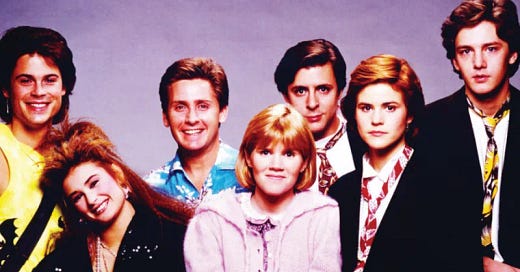"Brats" is a Hard But Interesting Watch
Andrew McCarthy's new Brat Pack documentary illustrates some dark areas of the human psyche.
This week’s ‘Daly Grind’ is a slight variation of a piece I wrote last week for Bernie Goldberg’s website. I figured my readers here might find it interesting as well.
Today I’m writing about a topic I’m sure is very near and dear to all of you: teen coming-of-age films from the mid 1980s.
Well, maybe not all of you, but hopefully some of you hopeless childhood romantics out there.
A week or so ago, my wife and I watched “Brats,” a new documentary on Hulu by Andrew McCarthy. McCarthy was a prominent actor of the aforementioned era and genre, and truth be told, his documentary was kind of hard to watch (for reasons I’ll get to in a minute). Still, the subject matter got me thinking about a time in American pop-culture that I hadn’t thought about in decades, and it provided enough psychological nuance to inspire today’s piece.
McCarthy, back in the 80s, was a member of the “Brat Pack.” The nickname (derived from the iconic Rat Pack) was assigned to a group of young actors who starred, often together, in teen-oriented flicks. Other staple members of the perceived clique were Emilio Estevez, Anthony Michael Hall, Rob Lowe, Demi Moore, Judd Nelson, Molly Ringwald, and Ally Sheedy.
I was very much a child of the 80s, but I’ve oddly never seen any of the marquee Brat Pack flicks, like Pretty in Pink, The Breakfast Club, and St. Elmo's Fire (though I dug the John Parr song). Still, the group was very much on my radar at the time for a rather offbeat reason. I used to buy teen-fan magazines at the PDQ down the street, cut out the pictures, and sell them individually to school classmates (mostly girls) for a collective profit.
Yes folks, I was an early adopter of capitalism. A young John Daly back then recognized the teen-heartthrob market and worked it hard.
Anyway, those images of young, moussed-up celebrities both amused and irritated me. As far as I was concerned, the pretty little twerps epitomized rich-kid entitlement, and I felt that way well before anyone had uttered the phrase, “Brat Pack.” When the moniker did work its way onto the pop-culture scene, it only validated my sentiments.
What I misunderstood at the time, however, was its origins. I figured that Estevez, Lowe, and the rest had self-appointed the nickname, fancying their cool and cocky selves as the second coming of Frank Sinatra, Dean Martin, and Sammy Davis Jr. But that very much wasn't the case. It was instead coined by New York Magazine writer David Blum, who wrote a piece on the group in 1985. Blum saw it as a clever play on words. The young actors he covered in the piece absolutely hated it. They found the nickname derogatory and dismissive of their talents, and it’s hard in retrospect to argue that they were wrong.
McCarthy, in fact, blames the moniker for derailing his acting career, in that it kept him from being taken seriously in Hollywood. His sentiment is shared, at least in part, by Estevez and Sheedy, both of whom were featured in the documentary. Ringwald wasn’t in the film, but one can assume, being that she disappeared from motion pictures perhaps more abruptly than the others, that she harbors similar feelings.
But was the nickname itself to blame?
That was the biggest contention I had with McCarthy while watching the film. The actor is still very consumed with, and flagrantly bitter over, the belief that David Blum’s framing almost four decades ago cost him virtually everything. Heck, it’s the entire basis for the documentary.
Interestingly enough, Blum agreed to sit down with McCarthy for the film. Though the two men handled themselves cordially, it was clear in shot after shot that McCarthy was boiling over inside, especially as Blum was describing how little thought and consideration went into the pop-culturally iconic nickname. It was like watching Captain Ahab stew about Moby Dick, not over a lost limb but lost stardom.
McCarthy put forth his best case for how one man’s words led to his career’s demise. The problem was that it wasn’t a very convincing one.
Sure, most in the Brat Pack didn’t maintain or recapture their glory years. The same was true of lots of young actors of the era who starred in similar films (including more successful features than those McCarthy appeared in).
Others, like Tom Cruise and Patrick Swayze, went on to become far bigger box office draws. So did Demi Moore, a member of the Brat Pack. Rob Lowe, another alumni, managed to revive his acting career and notoriety even after a sex-tape scandal (granted in mostly comedic roles). Robert Downey Jr., who one might describe as Brat Pack adjacent, conquered far worse demons and ultimately rose to the top of his profession. John Cusack, James Spader, and Matt Dillon also did quite well for themselves.
McCarthy didn’t. Nor did many others who were never branded with a nickname.
Hollywood, by all accounts, can be a very cruel place. What makes an actor or actress the toast of the town at one moment in their life and career isn’t always transferable to the next. Youthful appeal, like in those magazes I used to buy, doesn’t last. Trends change. Roles change. Typecasting can be a bitch. And yes, lots of politics are played behind the scenes.
McCarthy felt he had much more to offer, and perhaps he did. A lot of talented actors and actresses struggle with their careers, and most of them have never experienced anything close to the success McCarthy enjoyed as a young man. For that reason, it was quite off-putting to listen to McCarthy carry on and on about his 40-year grievance. The Brat Pack label has really done a number on his psyche, and though he at times presents the filming of the documentary as therapeutic for him, the underlying theme is that he’s searching for validation of his resentment.
It’s clear he wants someone to tell him, “Yes, you were irreparably screwed over — the victim of a snowball effect created by one man’s words.”
Sadly, a lot of people in this country, similar to McCarthy, have let grievances not only plague them, but define who they are. (Some may recognize Sean Coleman as such a person at the beginning of my book series.) It’s extremely unhealthy, it’s very hard for others to listen to and be around, and it isn’t helped by the fact that our political culture preys on, and encourages, such discontent.
There’s a lot to be said for taking personal ownership of one’s situation, forming some humility, and developing some gratitude for the successes and blessings in one’s life. I think it’s an aid to happiness, and I wish it for McCarthy and many others.
Have a favorite teen coming-of-age film? Tell me it in an email or in the comment section below?
That Face!
I recently saw this viral question posed on social media: Which film character’s facial expression will be forever etched in your mind?
For me, the answer was simple. And when news came last week of legendary film actor Donald Sutherland passing away (RIP), I was reminded once again of that very scene — the final scene — from 1978’s Invasion of the Body Snatchers:
Big Sale!
For a limited time, my award-winning novel "Safeguard" is part of a 40% off paperback sale through my publisher's distributor, IPG. Just enter the "Safeguard40" coupon code (at checkout time) on the IPG website to get your savings!
Random Thought
Obligatory Dog Shot
Three-way dance.
Featured Vinyl
Fun fact: I’ve liked the classic tune “Love is All Around” by The Troggs ever since a short-lived Gap commercial in 2002 featuring little known actors (at the time), Orlando Bloom and Kate Beckinsale:
The playful, youthful romanticsm of it struck a chord with me for whatever reason, and since getting back into vinyl records several years ago, I’d been looking for a Troggs album with that song on it — with no success — at every used record store I’d visited. I understand that I likely could have found it at any time on eBay, but part of the appeal of this hobby of mine is finding rare gems in the field.
One of my daughter’s presents to me for Father’s Day this year was treating me to a record of my choice. So, the two of us headed over to Downtown Sound in Greeley the other day so I could cash in on the deal. To my shock, I found the original 1968 title release in one of the bins (it hadn’t been there on any of my previous visits), and I’m very much enjoying listening to it.
What a stellar Father’s Day gift!
Catch Up on the Sean Coleman Thrillers
All of my Sean Coleman Thriller novels can be purchased through Amazon, Apple, Barnes & Noble, Kobo, Books-A-Million, and wherever else books are sold.
That’s all for now. Thanks for reading today’s Daly Grind.
Want to drop me a line? You can email me at johndalybooks@hotmail.com, and also follow me on Facebook, Twitter, Instagram, and now Threads! If you haven’t subscribed to this newsletter yet, please click on the “Subscribe now” button below. Doing so will get these posts emailed directly to you.
Also, if you’re not caught up on my Sean Coleman Thrillers, you can pick the entire series up at a great price on Amazon. And if you’re interested in signed, personalized copies of my books, you can order them directly from my website.
Take care. And I’ll talk to you soon!










